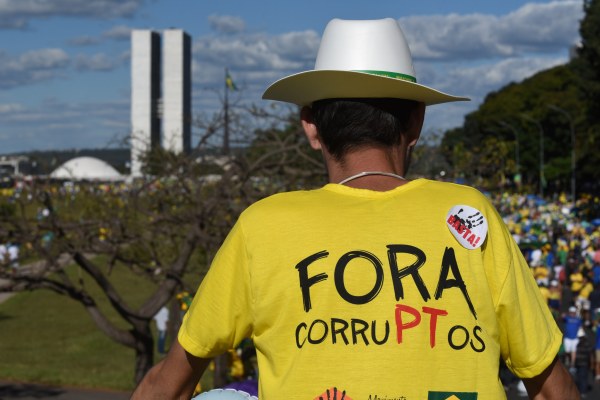By Fabio Kerche*

PSB Nacional 40 / Flickr / Creative Commons
Brazil’s Federal Prosecutors – treated as heroes by parts of Brazilian society and the mainstream press – have become so powerful and aggressive that they face growing allegations of violating some civil and political rights. The Lava Jato (Car Wash) investigation that helped bring down President Dilma Rousseff is not the first time that prosecutors have been in the spotlight; they are often easier to find in newspapers’ political section than among crime news. For instance, during the 1990s State Prosecutors sued hundreds of mayors and became protagonists in the Mensalão, a campaign finance scandal during the administration of President Lula da Silva. But their activities have never been as intense as recently, leading to the unprecedented “judicialization” of politics, a term that political scientists use to refer to over-reliance on the judicial system to mediate policy debates and political disputes.
The roots of prosecutors’ extraordinary power are in the 1988 Constitution, which assured their autonomy and gave them extensive civil and criminal tools with which to act. At the same time, lawmakers created few processes to ensure prosecutor accountability, making them autonomous even in relation to the Procurador-Geral da República, who is supposed to be the chief Federal Prosecutor but cannot provide effective oversight under current law. After passing the pre-employment examination, prosecutors cannot be fired or demoted. They are an army of 10,000 who are entirely independent of politicians and society. Unlike in the United States, where the President can dismiss a U.S. Attorney and electors can vote out a District Attorney, Brazil lacks analogous mechanisms for ensuring prosecutors’ professionalism.
Two innovations during the Partido dos Trabalhadores (PT) governments of Presidents Lula and Dilma fed the powers that now try to devour them.
- While nominating Chief Prosecutors for their two-year terms, they essentially waived their right to choose by going with the candidates with the most support from their own agency colleagues, at times based on institutional interests (such as wages) rather than professional integrity and vision. Not only did this weaken the influence of the incumbent President; it opened the way for leading prosecutors friendly with past administrations to become relentless pursuers of PT leaders. Dilma also approved legislation expanding prosecutors’ authority to offer plea bargains, reducing suspects’ sentences in exchange for information about accomplices and their bosses. Prosecutors and the judge responsible for Lava Jato have been constantly ordering arrests of officials, whose only ticket out of prison is to turn over information. Yet, since potential snitches cannot receive credit for reporting cases and names that have already been provided by others, this process has created a voracious accusation market and a deluge of new “facts” and new names, particularly including PT leaders. Suspects are condemned by public opinion, creating a true cycle that feeds on itself.
A survey released last week by Vox Populi and Brazil’s largest trade union federation, the Central Única dos Trabalhadores (CUT), shows that 43 percent of Brazilians think prosecutors are “fair” and treat all politicians equally. But an almost equal number – 41 percent – claim prosecutors persecute politicians from the PT and do not act against politicians from its principal adversary, the PSDB. With Brazilian society split over the Brazilian Prosecutors Office’s integrity, the lack of any instrument for punishing or rewarding prosecutors is particularly problematic. Brazilian citizens have few political and legal tools to wield against prosecutors whom they believe abuse power. When institutions fail and do not shape behavior, personal and political agendas become paramount. This is not a good democratic model, even when prosecutors are supposedly fighting against corruption. It opens the door to political witch hunts and erodes popular confidence in democracy and its institutions.
October 27, 2016
* Fabio Kerche is a CLALS Research Fellow and Researcher at Casa de Rui Barbosa Foundation, Rio de Janeiro.
